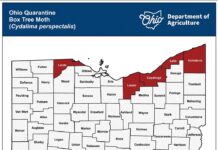By Amanda Tubaugh
Plants are one of God’s first creations, even before humans. There are many plants in nature, and if you leave the ground bare for long, nature will take over and start growing some sort of plant.
Many times, the plants that start growing on that bare soil are unwanted plants. In order to rid the soil of those unwanted plants we use cultivation or herbicides, both of which are not the way nature intended and will harm the microorganisms in the soil. What if there was a way that you could help the soil and your wallet at the same time?
There is — cover crops! Cover crops are any plants that are planted after the main crop is removed. Once the main crop is removed, the cover crop is planted and begins to grow.
Terminating cover crops
In Carroll County, cereal rye is the predominantly planted cover crop, but there are many options including a diverse mix of plants. Some cover crop plants survive winter easily, while others die over the winter.
The next spring, instead of hurrying out to plow up the fields, why not wait, and save money and time? When it is time to plant the upcoming crop, plant directly into the lush, green cover crop.
If your cover crop was one that winter killed, you are good to go. If the cover crop was one that survived the winter, once the crop is planted, you have two options to terminate the cover crop.
The best option is to use a roller crimper. It is a one pass tool that rolls and crimps the cover crop, breaking the stem and killing the plant. This plant will then become food for the soil and microorganisms that live there.
The second, and less appealing, option is to use an herbicide. Using a roller crimper is much cheaper than herbicide, which affects the profit of the crop at the end of the year.
Benefits
As the new crop begins to grow, it will come up through the now-dying cover crop. This cover crop will act as a mat, choking out other weeds, holding in moisture and keeping the soil cool during the hot summer months, all while feeding the soil. Cover crops will store nutrients from manure, mineralized organic nitrogen or underutilized fertilizer until the follow years’ crop can utilize them.
This reduces nutrient runoff and leaching, as well as reducing chemical fertilizer inputs. When a cover crop is managed for its contribution to soil nitrogen, the application of a nitrogen fertilizer for the subsequent crop may be less, thereby lowering the costs of production and reducing nitrogen losses to the environment.
But the benefits of cover crops don’t stop there. Cover crops also protect the soil from erosion, reduce soil compaction and provide a natural means of suppressing soil diseases and pests.
Soil
The best way to know what nutrients your soil needs for optimal plant growth is to perform a soil test. The results will tell you what and how much you need to produce a quality crop. If you use this information, you can plant a cover crop that will benefit your soil naturally.
There are 32,000 tons of atmospheric nitrogen above every acre. Legumes help pull that in. So, why would we want to pay for nitrogen, when we can get it for free? Legumes are just one example of a cover crop and how they can benefit you.
Challenge
You may think this information does not pertain to you if you don’t farm. But cover crops are a wonderful tool to use in your backyard garden as well, and everyone can benefit from a soil test.
I challenge each reader to try cover crops once — you’ll be amazed at the results. And it only gets better each year you use them.
I also challenge farmers to calculate how much profit they are making per field. Most times, yield does not indicate profit, especially when you add up how many inputs it took to get that yield.
For more information about cover crops, visit carrollswcd.org or nrcs.usda.gov.
(Amanda Tubaugh is the district administrator for Carroll Soil and Water Conservation District.)












